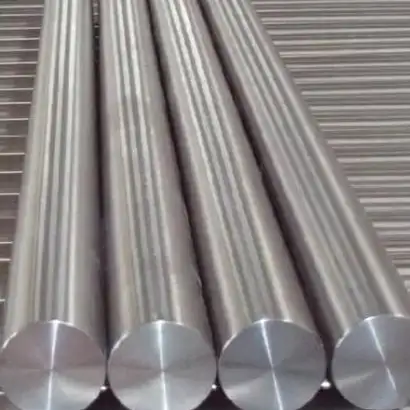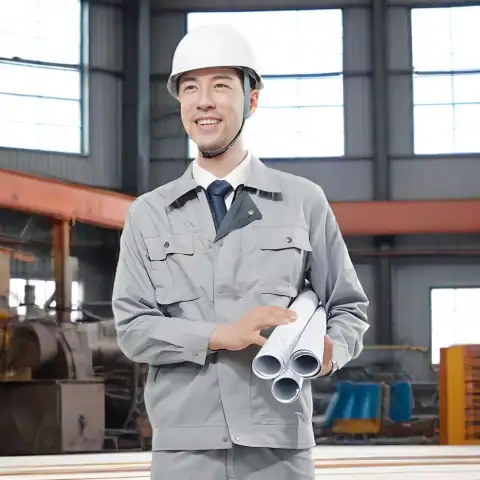AMS 5662 specifies the solution-heat-treated condition of Nickel-Chromium-Niobium Alloy 718 (commonly sold as Inconel® 718 / UNS N07718) in bar, forging and ring stock form. In this temper the alloy combines excellent weldability and formability with high strength after subsequent aging; it is widely used in aerospace, power generation, oil & gas and nuclear components where strength from cryogenic to ~700°C (≈1300°F) and resistance to corrosion/oxidation are required.
What is AMS 5662
AMS 5662 is an SAE Aerospace Material Specification that defines Nickel Alloy 718 in the solution heat-treated (unaged) condition for bars, forgings, flash-welded rings and stock for forging/rings/heading, with limits on maximum cross-sectional sizes that apply to the product covered. The specification lists composition limits, permitted melting practices (VIM, VAR, consumable electrode), required heat treatment (solution treatment near 968°C / 1775°F), sampling/test regimes, and acceptance tests tailored for bar and forging forms.
Chemical composition
Below is a concise composition table (typical limits used for AMS 5662 / Alloy 718). These are the compositional bands most manufacturers and specification documents present for UNS N07718 / Inconel 718.
| Element | Typical content (wt%) | Role / effect |
|---|---|---|
| Nickel (Ni) | ~50–55 (nom. 52.5) | Matrix former; gives corrosion resistance and high-temperature strength. |
| Chromium (Cr) | ~18–20 (nom. 19) | Oxidation and corrosion resistance; forms protective oxide scale. |
| Iron (Fe) | ~17–20 | Balance; contributes toughness and ductility. |
| Niobium (Nb, reported as Cb) | ~4.5–5.5 (nom. 5.1) | Forms Nb-rich precipitates (γ′′ type) that provide age-hardening strength. |
| Molybdenum (Mo) | ~2.5–3.5 (nom. 3.0) | Solid-solution strengthener; improves creep resistance. |
| Titanium (Ti) | ~0.6–1.2 (nom. 0.90) | Works with Al to form γ′ precipitates for strengthening. |
| Aluminium (Al) | ~0.2–1.0 (nom. 0.50) | Contributes to γ′ formation and high-temperature strength. |
| Carbon, Mn, Si, S, P, Cu, Co, V, B | Trace/minor | Controlled for impurity limits, machinability and mechanical behavior. |
Source note: the chemical bands above summarize AMS 5662/industry data sheets — always verify with your mill certificate for a delivered lot.
Heat treatment: solution condition (AMS 5662) and aging (AMS 5663)
AMS 5662 specifies the solution heat-treated condition: solution treatment near 1775°F (≈968°C) followed by air cooling. In this condition the alloy is soft, ductile and readily machinable. For high-strength service, parts are subsequently aged (precipitation hardening) to produce the γ′′ and γ′ precipitates that deliver the alloy’s higher tensile and creep strengths — aging schedules and the resultant condition are covered in AMS 5663 (and related aging documents). The standard practice for 718 is therefore: sell or supply to AMS 5662 (solutioned) and then, if required by the application, age to AMS 5663 or other customer-specified aging cycles.
Mechanical properties and operating temperatures
These figures are representative ranges for Alloy 718 in AMS 5662 (solutioned) and aged conditions. Use mill certificates and mechanical test reports for design values.
Representative mechanical properties (typical):
| Condition | Yield strength (0.2% offset) | Ultimate tensile | Elongation (in 2 in.) | Hardness (HB) | Useful temperature |
|---|---|---|---|---|---|
| Solution treated (AMS 5662) | ~400–650 MPa (varies by billet) | ~900–1250 MPa | ≥12% | ~200–300 HB | Up to ~650–700°C short term |
| Aged/precipitation hardened (AMS 5663 typical age) | ~800–1250 MPa (depending on process) | ~1100–1400 MPa | ≥10–15% | 300–400+ HB | High strength up to ∼700°C; excellent creep resistance for bolts, fasteners, turbine parts. |
Design guidance: use creep-rupture and fatigue data from vendor data sheets or independent test reports for parts operating near the upper temperature limit.

Fabrication, welding and machining — practical notes
-
Weldability: Alloy 718 is unusually weldable for a high-strength nickel superalloy; because its age-hardening response is relatively mild it can be welded in the solutioned or aged condition with lower risk of weld cracking than many other superalloys. Pre- and post-weld heat treatments depend on application and hardness limits.
-
Machining: 718 work-hardens quickly. Use sharp tooling, rigid setups, modest cuts and positive chip control. For best tool life, minimize dwell on cut edges and use appropriate coolant/lubrication.
-
Forming: The solutioned AMS 5662 temper offers the best ductility/formability; cold work plus aging is used when higher strength is needed.
Typical applications — why designers pick 718 (AMS 5662 stock)
-
High-temperature fasteners and bolts (aerospace & power generation).
-
Turbine engine components and spacers used up to ≈700°C.
-
Oil & gas downhole components (sub-surface safety valves, MWD/LWD tools) due to corrosion resistance and high strength after aging.
-
Nuclear and cryogenic components — 718 maintains toughness at low temperatures.
Quality, testing and acceptance (what procurement must require)
AMS 5662 calls for documented melt practice (VIM/VAR/consumable electrode), chemical analysis, tensile testing, hardness, and any non-destructive testing agreed by purchaser (e.g., ultrasonic for forgings). For bars and forgings, associated AMS documents (AMS 2371/2374/2808) cover sampling, testing and forging quality. ASTM B637 provides overlapping chemical and mechanical acceptance criteria for precipitation-hardening nickel alloys used in high-temp service; many purchasers ask for dual compliance or cross-reference to the ASTM standard. Always request: mill test report (MTR), melt route statement, and compliance to AMS 5662 revision (note year).
Sourcing & procurement: forms, lead times and buyer tips
Forms commonly stocked to AMS 5662 condition include round bar, flat bar, forged blanks, discs, and flash-welded rings. Lead times depend on inventory, melt route and certification. Typical buyer checklist:
-
Specify AMS 5662 (solution) or AMS 5663 (aged) explicitly.
-
Request MTR showing UNS N07718 and melt practice (VIM/VAR).
-
For oil & gas or sour service, confirm hardness limits and any NACE/API cross-certifications.
-
If cost is sensitive, compare China factory quotes (raw bar) vs. authorized distributors in NA/EU (stocked, higher price but faster delivery & traceability).
2025 global price comparison
Price for Inconel® 718 (AMS 5662) varies significantly by form, quantity, certification and region. The ranges below are market observed ranges in 2025 from distributors, alloy price summaries and marketplace listings; use them for budgeting and RFQ benchmarking only.
| Region / source | Typical 2025 price (per kg, USD) | Notes / source |
|---|---|---|
| China (factory / marketplace listings) | US$ 25 – 55 / kg | China cutters and small mills list bar/rod from ~$25/kg up to $50/kg depending on MOQ and solution/aged condition. |
| India (manufacturers/distributors) | US$ 30 – 65 / kg | Indian mills & traders publish competitive rates for bars/forgings; certified AMS/B637 stock may be at upper end. |
| USA (distributors, stocked bar) | US$ 90 – 150 / kg | Smaller quantity stocked product and certified AMS material command significant premiums; distributors and specialty-alloy warehouses list higher prices. |
| Europe (specialty stockists) | US$ 80 – 160 / kg | EU stockists (haraldpihl, voestalpine networks) show higher list prices due to inventory & traceability |
| Additive / powder feedstock (Inconel 718 powder) | US$ 70 – 250 / kg | Powder prices vary widely by producer (North America & Europe premium) |
Interpretation and buying tips:
-
Low figures from China/Made-in-China reflect commodity bar without heavy certification or small-lot overhead. High figures in NA/EU reflect stocked, traceable AMS/ASTM certified material and distributor margins. For critical aerospace or nuclear parts, pay the premium for traceability and specified melt practices.
FAQs
1) What’s the difference between AMS 5662 and AMS 5663?
AMS 5662 defines the solution heat-treated condition of Alloy 718 in bar/forging/ring forms; AMS 5663 covers the precipitation-hardened (aged) condition (higher strength). Specify which you need.
2) Can AMS 5662 material be welded and then aged?
Yes — 718 welds well in solutioned or aged condition. Often components are welded in solutioned condition then aged per AMS 5663 if required for final strength.
3) How do I get AMS 5662 material with traceable melt history?
Purchase from certified mills or distributors and request full MTRs showing the melt route (VIM/VAR/consumable electrode) and the AMS revision used for testing.
4) Is 718 suitable for sour-service oil & gas?
718 is used in oil & gas but sour service requires specific hardness limits and sometimes additional NACE/API compliance; discuss with supplier.
5) What temperatures can Inconel 718 handle?
718 retains strength up to ≈700°C (≈1300°F) for many applications; design for creep/oxidation data for extended service near that ceiling.
6) Should I specify AMS 5662 or ASTM B637 for procurement?
If aerospace customers or OEMs require AMS documents, specify AMS 5662. For general industry standardization, ASTM B637 is commonly referenced; many suppliers accept dual compliance.
7) What tests should I require on incoming material?
Chemical analysis, tensile test, hardness, and melt practice statement are minimal. For forgings ask for UT or other NDT if required by design.
8) How much does certification add to cost and lead time?
Certified AMS/ASTM material from western distributors can add 20–70% to raw commodity costs and increase lead time; stock availability reduces time. China factory lots are cheaper but ensure traceability if needed.
9) Are there direct EN / European equivalents?
EN equivalents exist (nickel superalloy naming differs); UNS N07718 / W.Nr.2.4668 cross-reference tables are used. Verify mechanical/chemical equivalence on an MTR.
10) What handling precautions for forged/solution treated 718?
Avoid high localized heating that could promote unwanted precipitates; avoid prolonged storage in corrosive atmospheres; follow vendor packaging and despatch instructions.
MWalloys — short supplier note
MWalloys supplies AMS 5662 (Inconel 718 / UNS N07718) bars and forgings from China-based mills and select global mills. We offer:
-
100% factory direct pricing on standard sizes (transparent quotes).
-
Fast dispatch from stock for commonly used diameters and rings; custom forging and machining service available.
-
Full documentation packages on request (MTR, heat-treatment statement, certification to AMS/ASTM).
If you require a formal quote, provide size/quantity/condition (AMS 5662 vs AMS 5663) and any additional certification needs (NACE/API/traceability). MWalloys can support small and medium volume OEM needs with rapid supplier sourcing.

